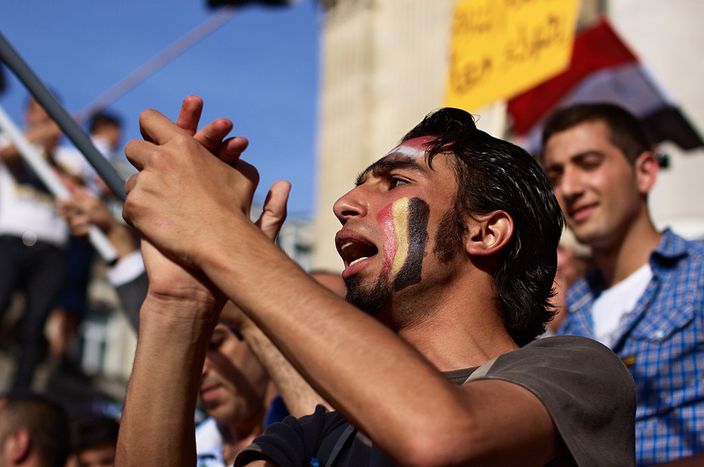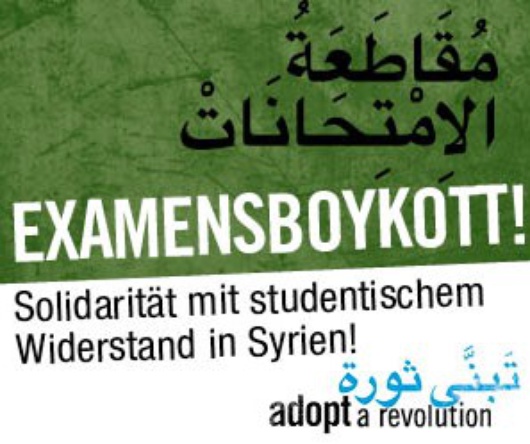
Germany’s 'Adopt a Revolution' initiative fights Syrian regime
Published on
Translation by:
Marie Jackson18 months of civil war in Syria has left almost 26, 000 people dead - with no end in sight to the crisis in the Middle East. Unarmed protest is one means of facing the violence - and is the preferred tactic of one German association founded in autumn 2011, which supports Syrian activists through donations.
Founder Andre Find talks to us about how Germans are supporting this peaceful resistance movement
cafebabel.com: Andre, what lies behind the idea of Adopt a Revolution?
Andre Find: After the successful uprisings in Tunisia and Egypt, a movement was also formed in Syria to topple the dictator Bashar al-Assad. Here in Germany - indeed, all over Europe - people rallied around the North Africans, yet were clueless about the situation in Syria. We wanted to create an interest in the Syrian conflict and show people how they could help support the Syrian people’s emancipatory movement. This is what prompted us to develop the revolution sponsorship model. Under the programme, people in Germany can choose a certain revolutionary citizen committee and then donate to this as regularly as they are able.
The project was inspired by a trip to Syria when the conflicts first erupted. It was also during this trip that we first made contact with opposition groups. Afterwards, we got together and thought about what we could do to help here in Germany - and so the idea was born to establish as direct a link as possible with the Syrian people in need of support in their daily struggle. Our aim was to build a bridge of solidarity between two countries.
cafebabel.com: How would you gauge the current situation in Syria?
Andre Find: The media only tells us about Damascus and Aleppo. There, the Syrian military has already abandoned some areas, and the first democratic grassroots movements are starting to form. Yet here, we’re only shown images of the civil war and we only hear of shootings. In Syria, there are between 500 and 800 demonstrations being staged right now – and these should also be receiving media coverage.
cafebabel.com: What are you doing here in Germany to help demonstrators?
Andre Find: In 2011, we collected and distributed almost 200, 000 euros to local groups organising unarmed protests in Syria. The groups develop media relations and then begin to provoke political debate on a local level by advancing democratic ideas. With financial backing, this political work can be continued. Emerging neighbourhood committees were also funded through donations at first. However, as the Syrian economy worsened, many of these committees just weren’t able to survive; support was needed from outside.
Read 'Unrest in Syria whilst president Bashar plays videogames in his palace' on cafebabel.com
We transfer the donations we collect to Turkey or Lebanon and then try to smuggle them over the border. This work is so important because the committees form the backbone of the resistance movement; indeed, they sit in virtually every local area and are not easily detected by the Syrian secret services. Activists are often attacked during protests. Yet despite this, they continue to brave the streets to fight for human rights and democracy.
cafebabel.com: One particularly large political action is and was the examination boycott by Syrian students.
 Andre Find: We focused on the work of students because we realised that they were being increasingly persecuted by the authorities. Students are staging unarmed protests with enormous enthusiasm, and are active on an entirely new level compared to other demonstrators. By using examination boycotts, they are showing solidarity with those of their peers who have already had to go underground because of their dedication to the cause. Adopt a Revolution is trying to prepare students for this transition, whilst at the same time, the students are able to bring the protest to their own cities and help their local committees.
Andre Find: We focused on the work of students because we realised that they were being increasingly persecuted by the authorities. Students are staging unarmed protests with enormous enthusiasm, and are active on an entirely new level compared to other demonstrators. By using examination boycotts, they are showing solidarity with those of their peers who have already had to go underground because of their dedication to the cause. Adopt a Revolution is trying to prepare students for this transition, whilst at the same time, the students are able to bring the protest to their own cities and help their local committees.
cafebabel.com: What do you think about the reaction of the UN to the Syrian conflict - it officially 'failed' its mission on 19 August...
Andre Find: The activists feel a little disappointed and would like Nato to get involved. However we see things a little differently; we don’t believe that further militarisation will be a sustainable solution in the long-term. Instead, we want to see greater support for the civilian resistance.
cafebabel.com: How else can Europe help?
Andre Find: The most important thing to us is that Europeans understand the current situation in Syria; the activists need to know that they are not alone. At the same time, Europeans can ensure that no more weapons reach Syria by enforcing stronger sanctions. On the humanitarian front, it should also be possible to bring injured activists to Europe for medical treatment. Finally, there are students that have come to Germany on a student visa and who can now no longer return home. They are at risk of becoming illegal immigrants.
cafebabel.com: How do you see your work evolving in the future?
Andre Find: Even though it is sure to be some time until the situation in Syria improves, an active civil society must be established in Syria. Democratic structures must also be strengthened so that it is no longer as easy for individuals to seize power. We want to support local activists in these endeavours.
Images: main (cc) Gwenaël Piaser/ flickr; in-text and video (cc) adoptarevolution.org
Translated from Syrien: Adopt a Revolution gegen Assads Regime



